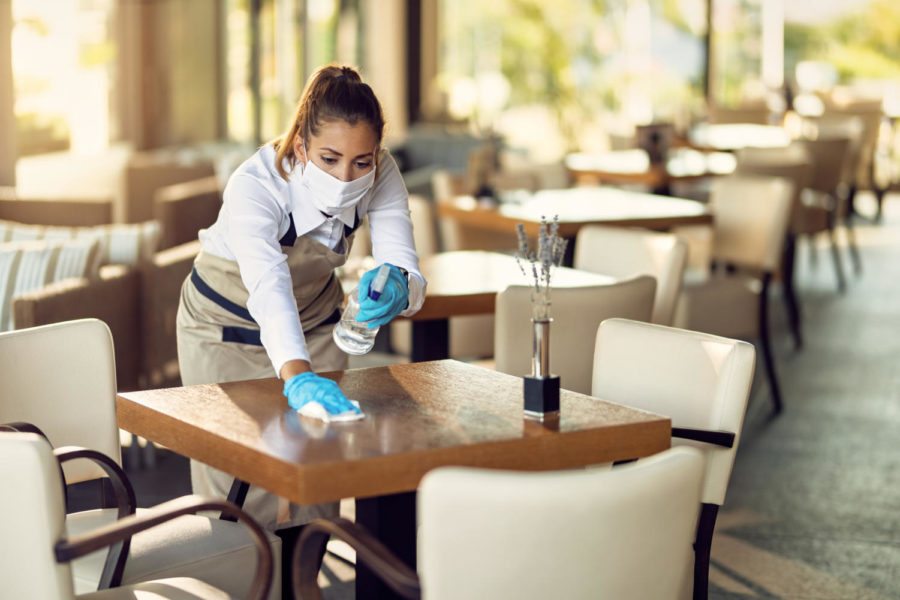Restaurants understaffed during COVID-19, Americans must return to work
Getty Images
Waitress disinfecting tables while wearing protective face mask and gloves due to COVID-19 epidemic.
May 14, 2021
As if mandates to prohibit restaurant dine-in service weren’t enough to negatively impact the industry, restaurants are understaffed and struggling to hire employees due to higher paying unemployment incentives. American citizens are responsible as a collective for reentering the workforce; it’s the only reliance we have to effectively provide business and services to society.
Restaurants that were able to pay their employees throughout the pandemic now find themselves without workers when they need them most. Raising the minimum wage has been a big debate in the country, but this is a spot-on demonstration of why it’s needed.
The maximum amount a person can receive on unemployment with no dependents is $484 per week, according to the Illinois Legal Aid website. Servers’ wages are typically less than that— a national estimate of the mean wage for restaurant servers is $13.20 per hour, according to a May 2020 data collection by the U.S. Bureau of Labor Statistics. It’s understandable that low-wage servers are enticed to take the bigger paycheck; employees should make enough money to pay rent and support themselves.
However, restaurants are hardly able to find stand-ins at the moment. The demand for restaurant workers is high. This means there won’t be a shortage of shifts for employees, which allows them to make more money per week than what they’re receiving on unemployment. Individuals just have to work for it.
Ultimately, the decision to not return to work for our local businesses because the government is giving money to those in need prohibits economic recovery from COVID-19.
“Taking that incentive away, or maybe giving some kind of incentive to help encourage workers to come back into the field would be great,” said Ryan Asta, owner of Louie’s Tap House in Roscoe, Illinois.
To receive unemployment in the state of Illinois, you must register with Illinois Job Link to “document your efforts” of seeking employment, according to the website. This is supposed to ensure individuals don’t take advantage of unemployment aid. However, it is actually making it worse on business owners preparing for potential candidates who have no intention of actually taking on the job.
Asta said that within just the past two weeks he had 11 interviews set up, and seven out of the 11 interviews were no call, no shows.
“Two people got hired, but once they got hired they were no call, no shows. And then the other two people were respectful enough to call beforehand and say that they changed their mind,” Asta said.
This is not the type of work ethic that helps rebuild America after a tragic pandemic. Yet, this hiring crisis highlights that workers are not making enough money on their current wages. It’s an American paradox when you have businesses in need, but the government is paying people more when they’re not working. Something has to change.
The COVID-19 pandemic is not over yet. Given the mental, physical and emotional turmoil events like this can present, it is understandable that the world is not ready to return to “normal.” We need to be willing to work together for society to function its best and to recover from the tragic year we’ve experienced as a nation.
Local businesses like restaurants need employees who have a desire to work, which has been nearly impossible to find right now. Finding kitchen staff to cook and prepare the food is even harder to find than front of house staff, Asta said.
It’s troubling to see that the industry is so understaffed at the same time when people are finally feeling comfortable going back to restaurants again. Approximately 40.5% of Americans have had at least one COVID-19 vaccine dose, according to the CDC COVID-19 data tracker.
Now that restaurants are seeing an increase in business, it’s also increasing the pressure on the short handed staff. Looking forward to the summer, one can only hope for spirits to rise and for individuals to return back to work, for there is no incentive for people to work right now if they don’t have to.







